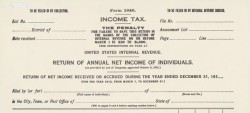Which president imposed the first federal income tax?
 August 5, 1861 — To help finance the Civil War, President Lincoln signed the Revenue Act of 1861 today, which imposed a flat tax of 3% on individuals earning between $800 and $10,000. The comparable minimum taxable income in 2009, after adjustments for inflation, would be about $19,000.
August 5, 1861 — To help finance the Civil War, President Lincoln signed the Revenue Act of 1861 today, which imposed a flat tax of 3% on individuals earning between $800 and $10,000. The comparable minimum taxable income in 2009, after adjustments for inflation, would be about $19,000.
Before asking Congress to act, Lincoln sent letters to cabinet members Edward Bates, Gideon Welles and Salmon Chase requesting their views as to whether the president had the constitutional authority to “collect [such] duties.” He also was concerned about the potential need to replace revenue from ports along the Southeastern seaboard, which he feared might fall under Confederate control.
In 1866, federal internal revenue collections reached their highest point in the nation’s 90-year history — more than $310 million, which was an amount not reached again until 1911.
After the end of the war, Congress repealed income taxes in 1872, and in 1895, the U.S. Supreme Court ruled income tax to be unconstitutional. It wasn’t until 1909, when Congress proposed the 16th Amendment, that today’s federal income-tax system was set in place. It was ratified in 1913.
Sources
Words of Wisdom
A right result at this time will be worth more to the world than ten times the men and ten times the money. The evidence reaching us from the country leaves no doubt that the material for the work is abundant, and that it needs only the hand of legislation to give it legal sanction and the hand of the Executive to give it practical shape and efficiency. One of the greatest perplexities of the Government is to avoid receiving troops faster than it can provide for them. In a word, the people will save their Government if the Government itself will do its part only indifferently well. Read more at http://millercenter.org/president/speeches/speech-3508.





